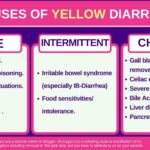White Mucus in Poop: 7 Causes Explained.
Our content is not intended nor recommended as a substitute for medical advice by your doctor. Use for informational purposes only.
Summary: What you need to know.
A mucus is an ordinary substance secreted by specialized cells inside your colon.
Mucus serves to keep your digestive system lubricated and moist. Also, mucus plays a role in your intestinal and colon motility and help fight gut bug (reference).
Often, a healthy individual will not notice mucus in stool. However, it may appear as a white jelly-like substance in your stool under certain circumstances (see the causes below).
Acute white mucus in poop is often due to an attack of gastroenteritis or dehydration. Chronic or recurrent white mucus in poop can be due to irritable bowel syndrome, anorectal fissures, inflammatory bowel diseases, etc.
Common causes include:
- Occasional findings in healthy people
- Acute infections (gastroenteritis).
- Irritable bowel syndrome.
- Food intolerances or allergies.
- Celiac disease
- Inflammatory bowel diseases.
Table of Contents
1. An occasional finding in healthy people.
Mucus in poop is present in small amounts in a normal healthy individual. Healthy mucus is often a transparent or whitish or yellowish semi-transparent jelly-like substance.
People won’t notice it most of the time. However, sporadic findings of little white mucus in poop are accepted if you have no other symptoms.
Also, dehydration due to the lack of fluid intake or fluid loss may notice mucus in their poop. Dehydration is one of the causes of increased mucus in poop, and the mucus often disappears when dehydration is corrected.
When white mucus in poop is NOT normal:
- Occur more often.
- The amount is significant.
- Associated with blood.
- Associated with other symptoms such as diarrhea, fever, weight loss, or belly pain.
The above symptoms and signs reflect an ongoing problem inside your digestive system. The list of common diseases and conditions that can cause a white coating (mucus) on your stool is explained below.
2. Acute gastroenteritis & dysentery.
Mucus helps trap and expel bacteria and other harmful microorganisms out of your intestines. Consequently, any infection will lead to a reflex increase in mucus secretion by your small intestine and colon.
Any infection can cause increased mucus in poop which can be white or colored (yellowish).
For Example:
- Acute viral gastroenteritis (stomach flu).
- Acute dysentery (can lead to mucus-only poop).
- Most types of foodborne illnesses (food poisoning).
- Also, chronic causes of intestinal infections can lead to white mucus in poop.
Symptoms of acute viral gastroenteritis (stomach flu):
- Most often, acute infections cause acute onset diarrhea with mucus (loose or watery stool with mucus).
- Abdominal pain (Belly pain).
- Nausea or vomiting.
- Lowgrade fever and body aches.
- Chronic infections, prolonged mucus in stool, diarrhea, and abdominal pain are frequent symptoms.
Symptoms of Dysentery:
- Severe, frequent attacks of diarrhea.
- The diarrhea is mixed with mucus, blood, or both.
- Extreme urgency to poop, but only mucus comes out.
- Abdominal pain.
- Fever (it can be of high grade).
More: Pooping mucus only: 12 causes explained.
4. Irritable Bowel syndrome.
Irritable bowel syndrome is a prevalent disease. But unfortunately, many people have IBS and don’t know it.
We don’t know the exact cause of IBS. The disease is classified as a (functional gastrointestinal disease). It is due to abnormal (function), not abnormal lesions.
Mucus in stool is very frequent with IBS. Therefore, Manning criteria are a method of diagnosis of IBS that includes (mucus in stool) as a part of IBS (reference).
Symptoms of IBS.
- Recurrent abdominal pain (at least one day per week for the past three months).
- Abdominal pain can either be relieved or triggered by defecation.
- Diarrhea, constipation, or both (in periods of flare-ups and remissions).
- Change in your stool form (with the onset of pain, your stool becomes harder or loose).
- Distension and bloating.
- White mucus in poop.
The diagnosis of IBS is based on specific symptom criteria (see the illustration below):
Learn More about the diagnosis of IBS here.
4. Food intolerances and allergies.
Food intolerance is widespread, and many people don’t know they have it. Approximately one in every five people has food intolerance (reference).
Intolerance occurs when your digestive system becomes unable to digest certain foods.
Accumulation of the undigested and unabsorbed food triggers intolerance symptoms such as:
- Distension and bloating.
- Diarrhea.
- Belly pain.
- Nausea and fullness in the upper stomach.
- Flatulence (passing gas frequently) and bloating.
- Lost appetite (anorexia).
- White mucus in poop.
Food allergy is a different form of abnormal body reaction to food. Some food constituents may trigger an allergic or immune response, leading to gut and allergy symptoms.
The differences are in the table below.
| Food intolerance | Food allergy |
| Affects 15-20% of the population | Affects nearly 2-5% of adults |
| Difficulty digesting certain types of food (not immune-mediated allergy). | An immune-mediated reaction to certain foods or food components. |
| Diarrhea is often random (you will get diarrhea every time you eat the offending food). | Usually causes acute attacks related to the ingestion of offending food. |
| Intestinal symptoms: diarrhea, extensive gas, bloating, abdominal pain, and mucus in stool. | Intestinal symptoms are the same. |
| No extraintestinal symptoms | Extraintestinal symptoms include rashes, urticaria, swollen lips, face, or life-threatening allergic reactions. |
| The severity of your symptoms is proportional to the amount you eat from the offending food. | Even trace amounts of the offending food can produce severe symptoms. |
Common offending foods:
| Common offending foods: (examples)
|
Learn more about food intolerance and food allergy.
5. Inflammatory Bowel disease.
Inflammatory bowel disease (IBD) is a term to describe conditions of chronic inflammation and ulceration of the digestive tract.
IBD is not rare; About 3 million US adults have IBD (reference). The exact cause of the diseases is not clear. But it is a common cause of blood and white mucus in poop.
Inflammatory bowel diseases are divided into two specific conditions:
- Crohn’s disease: inflammation and ulcers at any part of your digestive tract(from the mouth to the anal area), but the common location of Crohn’ is the lower right abdomen (as it commonly affects the terminal part of the small intestine, which is called the ileum) (ref).
- Ulcerative colitis: inflammations and ulcers affect the large intestine. The common location of Ulcerative colitis is the lower left abdomen (as it commonly affects the rectal lumen and sigmoid colon) (ref).
Symptoms of inflammatory bowel disease include:
- Diarrhea is commonly associated with blood or white mucus in the poop. The diarrhea is more severe and persistent and can occur in remissions and exacerbations.
- The stool can contain mucus only (as a fuzzy white coat) or mucus and blood.
- Intense abdominal pain.
- Fever and weight loss may present.
- Fatigue, anorexia, nausea.
6. Celiac disease.
Celiac disease is considered a form of food allergy. With celiac disease, your body is allergic to a protein called gluten (found in wheat, rye, and barley).
Eating gluten results in severe intestinal inflammation and the secretion of white mucus in your poop.
Diarrhea doesn’t occur in all cases of celiac disease; it affects only 45-85% of the patients. Excess white mucus in poop can signify celiac disease without diarrhea.
People with celiac disease improve dramatically after cutting off the offending foods.
Symptoms of celiac disease:
- Chronic diarrhea (in 45 to 85% of the cases).
- White mucus in poop.
- Bloating and gas.
- Nausea, loss of appetite.
- Weight loss.
- Anemia (can be severe if left untreated).
- Abdominal pain.
- In rare cases, it can cause constipation.
7. Rectal inflammation (Proctitis).
Proctitis is the inflammation of the rectal lumen. Proctitis can cause excess mucus secretion from the anorectal area and tenesmus (a sense of incomplete evacuation and persistent urge to poop).
Proctitis often results in excess mucus in poop or even mucus-only poop with a persistent urge to poop.
A characteristic symptom of proctitis is the constant or recurrent urge to poop with the passage of mucus or tiny stool amounts.
Causes of proctitis include:
- Dysentery (explained before).
- Inflammatory bowel diseases affect the rectal and anal canal (Crohn’s or ulcerative colitis).
- A sexually transmitted disease of the anorectal area.
- Anal fissures.
- Hemorrhoids (especially when they become inflamed.
- IBS.
- Rectal polyps and ulcers.
- Rectal cancer.
Learn more about proctitis here.
8. Others.
Other less common or rare causes of white mucus in poop include:
- Cystic fibrosis.
- Diverticular disease.
- Certain medications (especially medications that trigger diarrhea).
- Colorectal cancer.
- Radiation therapy.
- Eosinophilic proctitis.
- And others.
When to see a doctor for white mucus in poop?
- Abnormal large amounts of white mucus in the poop.
- Constant notice of white mucus for weeks or months.
- Associated abdominal pain.
- Associated changes in bowel movements (diarrhea or constipation).
- Associated fever or body aches.
- Associated Nausea, vomiting, or loss of appetite.
- Associated weight loss.’
- Associated blood in the stool.
- Evidence-based
- Written by a doctor.

Related Posts:
- Clear White Mucus In stool: 6 Causes (Doctor Explains).
- Pooping mucus only: 12 Causes Explained (Dr. Farahat).
- Mucus In Stool With IBS: Causes, Different Colors, &…
- Do Bananas Make you Poop? (GI Doctor Explains).
- 3 Reasons Why Apple Will Make You Poop (GI Doctor Explains).
- Fluffy Poop: 7 Causes & When to Worry (Doctor Explains).






